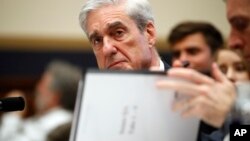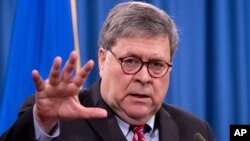The U.S. Justice Department on Wednesday released a confidential 2019 memo that advised then-Attorney General William Barr not to pursue criminal charges against then-President Donald Trump for obstructing the special counsel investigation of Russian election meddling.
The memo by Steven Engel, then head of the Justice Department’s Office of Legal Counsel, and Edward O’Callaghan, another senior official, was written on March 24, 2019, the same day Barr told Congress that there was “not enough” evidence to charge Trump with obstruction of justice in connection with the Russia probe.
“We recommend that you conclude that, under the Principles of Federal Prosecution, the evidence developed during the Special Counsel’s investigation is not sufficient to establish that the President committed an obstruction-of-justice offense,” the memo stated.
The nine-page document was released in response to a Freedom of Information Act lawsuit filed by Citizens for Responsibility and Ethics in Washington, or CREW, a left-leaning ethics watchdog based in the nation’s capital.
The Justice Department had resisted releasing the full report, arguing that it reflected sensitive internal deliberations. But a federal appeals court panel last Friday ordered the law enforcement agency to make the report public.
The memo came at the conclusion of special counsel Robert Mueller’s investigation of allegations the Trump campaign had colluded with Russia to change the outcome of the 2016 presidential election.
In his final report to Barr, Mueller wrote that he had not found enough evidence that Trump or his associates had criminally conspired with the Russian government.
But Mueller left unresolved the question of whether Trump had obstructed the federal investigation, leaving it to Barr to decide the matter.
Partly relying on the internal DOJ memo, Barr determined that Trump could not be prosecuted for obstruction of justice.
Barr’s announcement led Trump to tweet at the time: “No collusion. No obstruction, Complete and Total EXONERATION.”
Barr, who was a critic of the special counsel investigation before becoming Trump’s second attorney general in early 2019, drew fire from Democrats and other critics for giving Trump a pass.
In their memo for Barr, the two top DOJ officials wrote that Mueller’s findings did not warrant the prosecution of Trump.
“While cataloging actions that the President took, many of which took place in public view, the Report identifies no actions that, in our judgment, constituted obstructive acts, done with a nexus to a pending proceeding, with the corrupt intent necessary to warrant prosecution under the obstruction-of-justice statutes,” the officials wrote.
They also noted that Trump had not been charged with any crime or criminal conspiracy in connection with Russian election meddling.
“It would be rare for federal prosecutors to bring an obstruction prosecution that did not itself arise out of a proceeding related to a separate crime,” the memo stated.
In a statement, CREW said the memo “presents a breathtakingly generous view of the law and facts for Donald Trump.”
“It significantly twists the facts and the law to benefit Donald Trump and does not comport with a serious reading of the law of obstruction of justice or the facts as found by Special Counsel Mueller,” CREW said.
CREW faulted the memo for premising its conclusion on “the fact that there was no underlying criminal conduct, which is not what Mueller found.”


